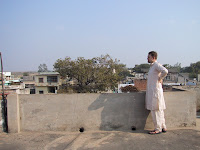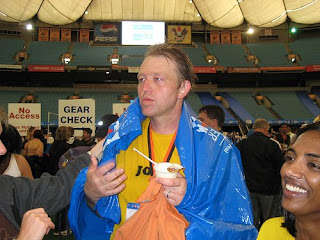The Funeral

"Vasu-ana, what are you still doing here?" I was sitting in Shireesha's uncle's house in the village and was surprised to see that Vasu hadn't left for Chennai yet. The birthday party had been the day before and most people were planning on leaving early to get back to the city in the morning. Shireesha and I were going to stay and relax in the village for 2 more days.
"You hadn't heard? Your uncle Munreddy died last night. He is your wife's, mother's, mother's cousin. Very inauspicious for travel. Everyone is staying for the funeral today."
"You can come," my uncle Mohan Reddy said with his loud and authoritative, yet broken, English. "Come, see our tradition for preparation of the dead person."
"I don't know..." I said reluctantly. As a tall, loping, very Caucasian person in a remote farming village, my appearance at public events usually tended to become the focus of such events. During my first trip to Proddatur, I had to be rescued with a tractor from a mob of children who were closing in on me quickly when I went to watch the Sankaranthi rabbit hunt.

"No. Is okay. He is family. You must come to see how we make funeral." Mohan-mama is a large, jolly man with a heart to match, but past experience had sometimes left me unsure if his overtures were not particularly culturally appropriate. This is a man who, when his daughter was married, had built a castle to host his guests. Literally a castle, complete with turrets and towers and gates, in a town where many houses have dirt floors and people still draw water from wells. He and his wife moved out of the castle shortly after the wedding. But it's that combination of audaciousness and generosity that makes him well loved by everyone, including myself.
Considering the funeral, I remembered seeing the cremation pyres in Varanasi 4 years prior. While it was completely mind blowing, it was also unseemly, and gawking at the burning bodies there made the discomfort of the stares I receive in the village trivial by comparison. But this was the village. And it was family, I tried to convince myself. And I knew that whatever was involved, it would a pretty unique experience. In the end, though, I decided I was still just a tourist, not a cultural anthropologist and since I had never met the man, I should respect the solemnity of the event and stay away. Not wanting to let down my uncle, who was clearly excited about taking me to this event, I said "Well, we'll see what's happening later, but if I am not back here by 2, then go without me."
At about 3 o'clock, my wife and I decided we'd walk back to her uncle's house to have lunch and hear about the funeral.
"Can we take the short cut through the alley? I hate walking along the main road, people are always staring and wanting to come up and talk to me."
"Okay, it's this way," my wife said.
 As we turned down the alley, we could see some kind of tent placed in front of a house and as we got closer, it was clear that a crowd was forming. "Oh crap" my wife said, "It's the funeral."
As we turned down the alley, we could see some kind of tent placed in front of a house and as we got closer, it was clear that a crowd was forming. "Oh crap" my wife said, "It's the funeral."Before we could turn around, we'd been spotted by my uncle who was beaming with a wide smile as he stood up and waved me over. He asked the man sitting next to him to get up and offered me his chair. Right. In. Front. I supposed that the explanation that we were taking a short cut to go to his house to see him wasn't going to get me out of the funeral gracefully.
"Where the hell are you going?" I said to my wife who was leaving me on my own.
"I have to go inside with the women. Good luck."
At that point, there was nothing I could do but be gracious, humble, and awed by the turn of events that led to this suburban California boy becoming a front row witness to a traditional Hindu village funeral.
After a period of time where people paid their respects to the deceased in the front room of the house, the undertakers began to construct a bamboo stretcher. One man brought a live chicken forward. My uncle narrated. "They will bring one hen. That hen will be tied to the man." He looked intently at me and put his two fists together, as if to explain, then raised his arms to the sky, opening his hands wide.
The body was then brought to a chair in the front yard where the man's sons ritually bathed him with several buckets of water. He was then wrapped in a brand new dhoti and laid onto the bamboo stretcher, about 2 feet in front of me. "Now you will see them spread the spices." The body was anointed with turmeric, red powder, and some type of oil and then covered in flower garlands. A small fire with incense was started on the ground at the man's feet and one by one starting with the man's surviving mother, sons, and followed by the remaining friends and relations in the crowd, each person held their palms over the burning incense and then touched the man's feet.
Two Indian clarinets and a drum started blaring music as those in attendance completed their blessings. The man's sons gathered round the body and raised the stretcher to shoulder height. With the musicians leading, the gathering then formed into a procession that led down the alley. I marveled at the fact that all of this happened within hours of the man's death. They were taking the deceased to the outskirts of the town for cremation. My wife and I decided to peel off from the procession at this point, as did many of the attendants.
"Are you sure you don't want to see them burn the body?" my uncle Mohan said.
"No, that's okay. This has been quite an experience for me."
Mohan-mama smiled. "Is this how they do in America?"

Comments